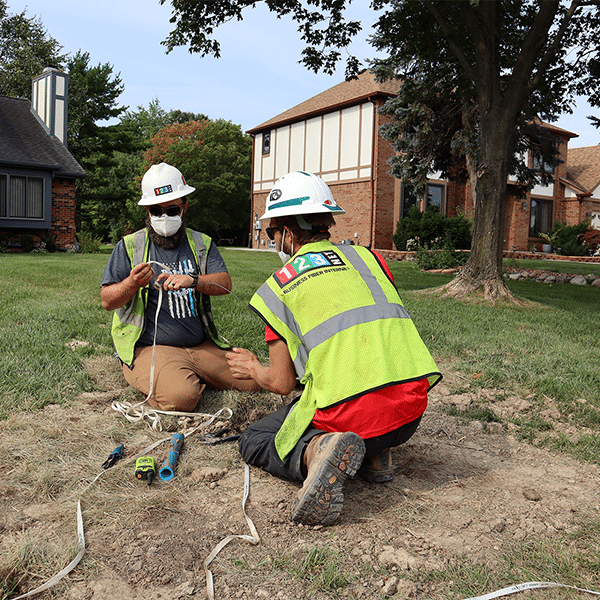Michigan broadband provider 123NET is leveraging its myriad of existing relationships, state and federal government funding and nearly 30 years of telecom experience with the goal of making Michigan the “best connected state on the planet” by venturing much deeper into the fiber-to-the-home (FTTH) deployments that it began in 2021.
The privately-owned, Southfield, Michigan-based service provider recently announced a public-private partnership with Michigan’s Allegan County Board of Commissioners after being selected from the pool of 11 service providers that responded to an Allegan County RFP for a partner to deploy FTTH to 12,000 residents. In addition, the county was “specifically seeking a partner” to pursue grant money from Michigan’s Realizing Opportunity with Broadband Infrastructure Networks (ROBIN) fund, according to Justin Lampman, Vice President – Network Operations for 123NET.
The partnership proved successful with an award of $30 million in ROBIN funding. In addition to the grant, Allegan County is using some funding it received from the American Rescue Plan Act for its total contribution of $17.5 million, while 123NET is investing $17.5 million of its own capital for a total project investment of $65 million, said Lampman.
The partners have since been busy preparing to build a county-wide, 1,100-mile, open-access FTTH network. Allegan County has assembled a team that is working to aggregate data about its residents and communicate with them about the project, while 123NET has been focused on providing those residents with high-speed Internet connectivity. The service provider also has established partnerships with TV and phone service providers that it hopes to launch soon, said Lampman.
However, the open-access, carrier-neutral network will be open to third-party phone service providers, triple-play providers or anyone providing services that Allegan County’s residential customers want, he said. Construction will begin as soon as the grant money is released by the state, either this month or in September, and work will be completed by 2026.
The Road To Residential
Founded in 1995 as an Internet service provider (ISP), 123NET expanded its services and its business client base over the years by offering fixed wireless, carrier-neutral data center colocation and voice services. The company also founded the Detroit Internet Exchange (DET-iX) in 2014 and began deploying fiber to its business customers in 2015. 123NET also recently announced it would further enrich its fiber footprint across the state by launching a second middle-mile fiber project with partner Peninsula Fiber Network, LLC.
So, what made a successful enterprise services provider decide jump into the residential market two years ago?
“It was a variety of things, but one of the main reasons was COVID-19. Everyone had to work from home and that really highlighted a lot of the issues with [residential] connectivity,” said Lampman. “We decided in that moment that we wanted to bring our carrier-level, commercial-grade products to people’s homes.”
Since 2021, 123Net has been deploying FTTH networks in neighborhoods via self-funded overbuild projects in Southeast Michigan, said Lampman. Southeast Michigan is the most populous area of the state.
“We have a customer base there and we have also been working on building into multitenant buildings to compete with existing providers, and, in some cases, do what we call bulk Internet or Internet as an amenity to everyone in the building. We have done quite a few of those,” he added.
In addition to furthering 123NET’s mission to expand fiber-based broadband connectivity across the state, deploying FTTH is “absolutely commercially viable,” said Lampman, adding that state and federal grants make “even the rural builds economically viable, now.”
Programs such as the federal government’s Broadband Equity Access and Deployment (BEAD), which has allotted over $1.5 billion for deployments in the state and ROBIN’s $238 million in total grant money “almost feel like a once in a lifetime opportunity” to solve the problem of providing connectivity throughout Michigan, said Lampman.
“And we are lucky enough to have two opportunities to get funding between both ROBIN and BEAD,” he added.
Since the partnership’s ROBIN award, 26 other Michigan counties have reached out to 123NET. The service provider is currently in conversations with each of them as it tries to try to position itself for future BEAD grant opportunities, said Lampman.
“Not all of them are going to be a good fit for partnerships. We are just trying to make sure that we cover our bases for all of the areas in Michigan that we feel we are best suited to help solve this connectivity problem,” said Lampman.
The people in 123NET’s sales organization who have been focused on the government and education sectors, and people on the company’s operations team, are engaging in those conversations, he added.
To date, 123NET’s existing relationships with municipalities across the state have been a big help in launching its FTTH products and they will help smooth and speed any future FTTH deployments, he said. The company is deploying both active Ethernet, “where it makes sense,” and Adtran’s SDX 620 Series XGS-PON.
In addition to grants and future partnerships, Lampman acknowledges that 123NET’s success will require a great deal of commitment to its new market.
“When I think about commitment, I think about our commitment to Michigan. And that is what really differentiates us from a lot of our competition,” said Lampman. “Our mission statement is not just something we say.”
Up until receiving the ROBIN grant, 123NET had been self-funded and the company’s four owners remain very committed to the company mission, he added.
“They’re the ones who made it our mission and built the company around it,” said Lampman. “The new grants are a new funding source for us, but we believe they are in line with our mission, as opposed to being a distraction from it.”
For more information about Michigan broadband, including the ROBIN funding program, with links to state broadband office resources and news coverage, visit Telecompetitor’s Broadband Nation page for Michigan.

